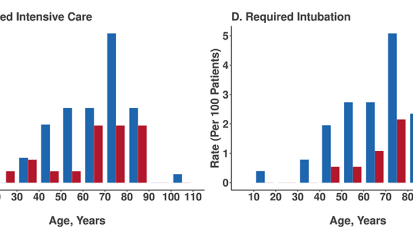Search Videos and More
 News
News
Gene Suppression Slows Esophageal Cancer in Mice
A recent study found ways to block the genetic circuitry of esophageal cancer cells and slow tumor growth in laboratory mice. If confirmed in follow-up studies, the results could suggest a potential new way to treat one of the deadliest types of cancer. News
News
Low-Carb Diet Could Slow Prostate Tumor Growth
An extremely low-carbohydrate diet could have a modest effect on slowing tumor growth in men with recurrent prostate cancer in addition to producing significant weight loss, a preliminary study has found. News
News
Acclaimed Hematologist Joins Cedars-Sinai Cancer
Internationally recognized hematologist John P. Chute, MD, has been selected to direct the Division of Hematology and Cellular Therapy in the Department of Medicine at Cedars-Sinai Cancer. News
News
COVID-19 Study: Men Need the Most Hospital Care
Male patients hospitalized for COVID-19 (coronavirus) are more than twice as likely to need intensive care and three times as likely to need intubation compared with female patients, according to new research from Cedars-Sinai. News
News
Blood Vessel Defects in Eyes May Foretell Alzheimer’s
Alzheimer's disease in its early stages affects the integrity of small blood vessels in the retinas of patients, according to a recent study led by Cedars-Sinai. This discovery holds promise for early diagnosis of Alzheimer's through the retina, a back-of-the-eye organ that is an extension of the brain and easily accessible for live, noninvasive imaging. Video
Video
Climate Change: Lungs
How does climate change affect your lungs? Cedars-Sinai pulmonologist Dr. Zab Mosenifar weighs in. News
News
New Clinical Trial at Cedars-Sinai for Active Surveillance of Thyroid Tumors
Statistically, the incidence of thyroid cancer—especially among women—has increased worldwide over the past few decades News
News
Cardio-Oncology Gets to the Heart of Cancer Patients' Health
Cedars-Sinai experts in the Smidt Heart Institute are making heart health a priority for cancer survivors and patients through the Cardio-Oncology Program. The program is more relevant than ever because cancer patients are living longer than ever. The five-year relative survival rate for all cancers combined has increased substantially since the early 1960s, from 39% to 70% among white patients and from 27% to 64% among African American patients. News
News
New Research Explores Link Among Diabetes, Pancreatitis and Pancreatic Cancer
When a patient is diagnosed with Type 2 diabetes, physicians are rarely thinking of chronic pancreatitis as the cause. However, chronic pancreatitis may be more prevalent than clinicians realize. News
News
Parkinson's Disease May Start Before Birth
People who develop Parkinson’s disease before age 50 may have been born with disordered brain cells that went undetected for decades, according to new Cedars-Sinai research. The research points to a drug that potentially might help correct these disease processes. News
News
Study: Low Complication Rate for Brain Stents
A national study led by Cedars-Sinai provides further support that a specialized stenting system for opening blocked brain arteries has a low rate of complications and may be as good or better than traditional medical therapy for certain patients with a stroke history. Video
Video
VR in Healthcare Q&A with Dr. Brennan Spiegel
Cedars-Sinai expert Dr. Brennan Spiegel answered some questions about using VR in healthcare on FacebookLive. Check out his answers to some of the most commonly asked questions.